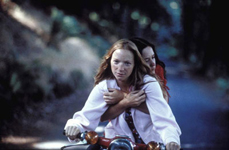My Summer of Love
|  When Mona and Tamsin, two disaffected teenage girls, meet in the Yorkshire countryside, it is clear that they couldn't be any different. While Mona is fair, blonde, and working-class, Tamsin is dark, sultry, and from a wealthy family. Their social discord is epitomized in their means of transportation -- whereas Mona makes her way around on a beat-up scooter that lacks an engine, Tamsin rides a thoroughbred horse. Our first image of her is from Mona's canted point of view, as she looks up from where she is lying in the grass and sees Tamsin atop her steed, like something from a dream. When Mona and Tamsin, two disaffected teenage girls, meet in the Yorkshire countryside, it is clear that they couldn't be any different. While Mona is fair, blonde, and working-class, Tamsin is dark, sultry, and from a wealthy family. Their social discord is epitomized in their means of transportation -- whereas Mona makes her way around on a beat-up scooter that lacks an engine, Tamsin rides a thoroughbred horse. Our first image of her is from Mona's canted point of view, as she looks up from where she is lying in the grass and sees Tamsin atop her steed, like something from a dream.Their summer together turns into a fever dream of sorts, and Pawel Pavlikovsky's My Summer of Love is at its best when it is focused intently on the burgeoning emotional intensity between the two girls. Like his first feature film, Last Resort (2000), My Summer of Love takes place in an almost hermetically sealed world that allows us to zero in on the development of the two main characters, who are brilliantly portrayed by Nathalie Press and Emily Blunt. Both Mona and Tamsin are wounded birds, cut adrift in the world with nothing to hold onto, which is why they end up clinging so fiercely to each other. Mona is an orphan (she never knew her father and her mother died of cancer) who lives with an older brother from whom she feels emotionally estranged, and Tamsin lives in an ivy-encrusted castle-like manor with parents who are so distant that they might as well be dead. Both have suffered loses (Mona's mother and Tamsin's sister, who died of anorexia), and they both strike out at the world, although Mona's is a more primal, uncontrolled sort of anger, whereas Tamsin's is eerily calculated. Nathalie Press, whose strawberry-blond hair, pale skin, freckles, and slight awkwardness suggest Sissy Spacek in the early '70s, has a difficult task in making Mona sympathetic. As written, Mona is crude and self-centered, yet Press invests her with a sense of longing that goes a long way toward explaining how and why she lashes out at those around her and why she would be so immediately taken with Tamsin. Emily Blunt, who is a stunning natural beauty, embodies Tamsin with a sense of benign authority; even when she's at her most emotionally vulnerable, we get the sense that she is actually completely in control. Her nature is that of a born impostor, even when she's being honest. Unfortunately, My Summer of Love is not just about the relationship between Mona and Tamsin. Rather, it also incorporates a subplot involving Mona's older brother, Phil (Paddy Considine), a former criminal who found God in prison and has since become a born-again Christian. Mona is embittered by Phil's new spiritual take on life, although her acrimony toward his faith is never really explained. She has a snit fit when he pours out all the booze in the family pub and turns it into a meeting place for all the local Jesus freaks. In some sense, Phil's religion is connected to Mona's relationship with Tamsin in that they both function to fill a void in their lives -- salvation of different sorts. The parallelism is extended by the fact that both rely heavily on performance and that both, in their own ways, turn out to be shams and crumble at the moment of greatest need. Yet, the problem is that any time the film deals with Phil's religion, it slips from introspection into near caricature. Whereas Mona and Tamsin's relationship is dealt with tenderly and realistically, Phil's spiritual conversion reduces him to a set of silly, context-less Christian signifiers. The film never even pretends to explore the nature of faith because it's too busy setting Phil up as a failure. At all times it is conveyed that his spirituality is performance (we never see him, for example, praying alone, only in front of others), thus when his religion fails him, there is no surprise or emotion, just the dull sense of a constructed inevitability. The deck, in effect, is stacked. If My Summer of Love had either focused exclusively on Mona and Tamsin's relationship or if it had found a way to better integrate Phil's newfound religion into the story, it would have been a deeply moving portrait of lost people trying to find their way in the world. It has glimmers of that possibility, and while the film is sometimes beautifully moving during those moments, they function primarily to remind us of all the ways the rest of it goes wrong. Copyright ©2005 James Kendrick Thoughts? E-mail James Kendrick All images copyright ©2005 Focus Features |
Overall Rating: 
 (2)
(2)


